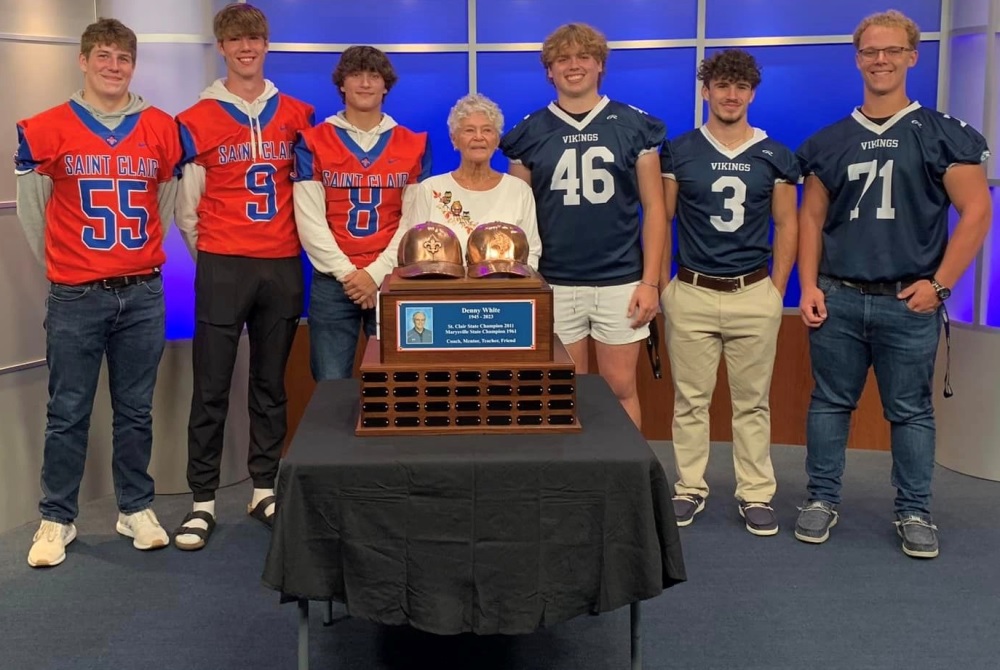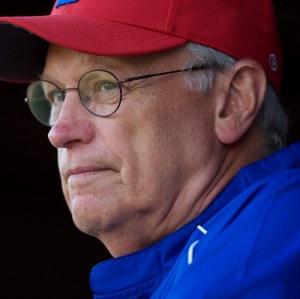
Working Through Transfer Trends
December 2, 2015
By Jack Roberts
MHSAA Executive Director
One of the responsibilities that schools have asked organizations like the MHSAA to execute is the management of transfer student eligibility. Historically, many associations have linked eligibility to residence ... thus, for some the regulation has been called the “Residency Rule” or “Transfer/Residency Rule,” not merely the “Transfer Rule.”
Over the years, as society became more mobile and families less stable, these rules became more and more complicated; and now, for most state high school associations, this is the regulation that consumes the most (or second) most pages of their handbooks. Over the years, this has also been the regulation most frequently challenged in court.
Over the years, some states have relaxed their transfer rule and others have refined their transfer rule. In either case, the transfer rule remains an imperfect rule, an imperfect net. Sometimes this net snags students who should not be made ineligible, and for those situations all associations have arranged some kind of waiver or appeal process.
And sometimes, and much less easily solved, the net fails to catch the situations it really should ... the transfers that are not hardship related or the result of some very compelling educational need, but those that are obviously for athletic reasons. It is those that we have been most focused on in Michigan.
Our first effort to get at the most problematic transfers was the adoption for the 1997-98 school year of what we called the “Athletic-MOTIVATED Transfer Rule” ... Regulation I, Section 9(E). Examples of an athletic-motivated transfer are included in the rule. The rule only applies to transfer students who do NOT meet any of the stated exceptions for immediate eligibility and are ineligible for one semester under our basic transfer rule. They become ineligible for 180 scheduled school days if there is a finding that the transfer was more for athletics than any other compelling reason.
This effort has not been successful enough because it requires a school that loses a student to another school to promptly allege to the MHSAA office, with supporting documentation, that the transfer was more for athletic reasons than any other compelling reason. The receiving school then must respond to those allegations. Then the executive director makes the decision. The unfortunate result of applying this rule is that it usually causes hard feelings between the schools, and hard feelings toward the executive director by the school decided against. In 17 years, schools have invoked this rule only 45 times.
Our more recent effort to address the most egregious athletic transfers resulted from requests from the coaches associations for wrestling and basketball, which were watching too many students change schools for athletic reasons, usually related to an out-of-season coaching relationship. The new rule – the “Athletic-RELATED Transfer Rule” – is Regulation I, Section 9(F). The difference between Section 9(E) and the newer Section 9(F) is that in 9(F) one school does not have to make and document allegations before staff can act. If MHSAA staff discover or are informed of any of the circumstances listed in 9(F), we can act. Again, the rule only applies to those transfer students whose circumstances do NOT meet one of the automatic exceptions. It applies only to students who are ineligible for a semester under the basic transfer rule. If there is a finding that one of the athletic related “links” exists (usually an out-of-season coaching relationship), then this transfer student who would be ineligible for one semester is made ineligible for 180 scheduled school days.
So far, it appears that 9(F) may be a better deterrent than 9(E). It has been referenced when students are rumored to be transferring, and it has stopped many of those transfers before they occur. We expect 9(F) to be an even better deterrent in 2015-16 because the rule has been broadened to apply to administrators and parents (not just coaches) and to address directing and coordinating athletic activities (not just coaching).
We have said that if this latest effort does not succeed in slowing athletic transfers, then the next step is 180 days of ineligibility – at least in any sport the student played in high school previously – for all transfer students who do not qualify for an exception that permits immediate play. I fear that would catch far too many students who should not be withheld so long from competition and could lead to a period like the early 1980s when the MHSAA, at the request of the state principals association, adopted the core of the transfer rule we have today and which resulted in a period of busiest litigation for the MHSAA when, at one time, the association had more than a dozen cases in court simultaneously on transfer matters. We’ve got to make the current rules work – with tweaks, perhaps; but not with radical revision.

Marysville, St. Clair Join Together to Honor Beloved Coach with Rivalry Trophy
By
Paul Costanzo
Special for MHSAA.com
October 11, 2023
Denny White brought quite a bit to the Marysville and St. Clair communities.
 In 1961, as a junior in high school, White was part of the first team to bring a football state title to Marysville.
In 1961, as a junior in high school, White was part of the first team to bring a football state title to Marysville.
Fifty years later, as an assistant coach, he played a vital role in bringing St. Clair its first MHSAA Finals title in baseball.
During the years in between, and decade after, White brought his knowledge of and passion for those sports to hundreds of student athletes.
But most recently, he brought the two communities together.
This past Friday night, the rival schools played for the Denny White Trophy, an award created to honor the late coach and connect the two communities where he was most revered.
“I’m so happy with all the support that has been around the project,” said Brady Beedon, a family friend who helped to create the trophy and was in the booth calling Friday night’s game for Get Stuck On Sports. “It’s the least we could’ve done for a man who helped so many athletes. His legacy deserves to be preserved.”
In a fitting tribute to White, who died Jan. 22 of this year following a long battle with cancer, the two teams played a hard-fought game at East China Stadium, with White’s alma mater Marysville coming away with a 25-20 victory.
Both teams featured players who had been coached by White at some point in one or both of the sports, as his time on the bench lasted through the fall of 2022.
 That season, he coached the JV B football team at Marysville. Most recently before that, he had been the varsity baseball coach at St. Clair from 2015-21.
That season, he coached the JV B football team at Marysville. Most recently before that, he had been the varsity baseball coach at St. Clair from 2015-21.
“Not much can unify rivals, but Coach White’s influence goes beyond that rivalry,” Marysville football coach Derrick Meier said at a press conference unveiling the trophy. “He’s affected thousands of local athletes. … It is awesome that someone had such an influence across the board with all local athletes (in multiple) sports. I contacted him my first year coaching varsity, and he was not willing to leave where he was at. I called him three subsequent years; he graciously declined. The last year he did accept, we added a JV B team, his wisdom and knowledge went well beyond just coaching on the field. We’re all lucky for his influence.
“Heroes get remembered. Coach White will be remembered.”
White was a 1963 graduate of Marysville, who then attended Ferris State and Central Michigan. His coaching journey did not begin in the area where he grew up, however, as he coached baseball and football at Newaygo High School before coming to St. Clair.
He spent 35 years in the Saints athletic program, coaching baseball and multiple levels of football.
Much of his time was spent as the pitching coach for St. Clair for coaches Richie Mallewitz and Bill McElreath. That included the 2011 season, when his pitching staff included current major leaguer Jacob Cronenworth, who now plays second base for the San Diego Padres.
Also on that staff were Joel Seddon, who was drafted twice – once out of high school and again after college – and would go on to be the closer at South Carolina; and Jared Tobey, who pitched at Wayne State and was drafted by the Detroit Tigers, playing four years in their minor league system.
While White coached nearly 1,000 baseball games in his career, he was involved with more than just high school sports. He also coached a 13-year-old Little League team to a state title and the semifinals of the Great Lakes Regional in 2015.
 No matter the level, White poured all he had into coaching, and that included his final season on the sidelines at Marysville, just months prior to his passing.
No matter the level, White poured all he had into coaching, and that included his final season on the sidelines at Marysville, just months prior to his passing.
“Every single kid that he touched with that team, you could just tell, gravitated toward him immediately,” said Travis Disser, who coached with White that final year at Marysville. “His lessons and his light-hearted humor are just something that you can’t replace, or ever hope to. I was lucky enough to learn pitching from Coach White when I was a younger kid, as well. He was the exact same Denny White as he was all those years ago, as he was last year during his battle with cancer. Coach White was a warrior in every sense of the term. His lessons, both on the field and off the field from him, are something that I’ll never, ever forget.”
The idea to create the trophy honoring White came about not long after his death, as Beedon worked with Meier, former St. Clair athletic director Denny Borse and St. Clair assistant football coach T.J. Schindler to create and design the trophy.
The final product is a two-tiered trophy topped with a pair White’s hats – one from St. Clair, the other from Marysville – that have been bronzed. It includes the years in which he won his state titles at his respective schools, and a passage about his life. There is also room to list the yearly winners, as it is planned to represent the rivalry and shared respect for White in the two communities for years to come.
“Whether it was Little League kids over the last 20 years, or some of the football players and baseball players that he coached over the decades that he coached, all of them when they get together have great stories and fondness for all the memories that (White and his fellow coaches) helped them create,” said Sandy Rutledge, the current St. Clair athletic director and a longtime friend and colleague of White. “I think it’s awesome that now as we play for this trophy every year, it will give our coaches a chance to kind of explain who Coach was. The next generation, maybe they didn’t even know him, will know that he is a legend, and he’ll always be remembered.”
 Paul Costanzo served as a sportswriter at The Port Huron Times Herald from 2006-15, including three years as lead sportswriter, and prior to that as sports editor at the Hillsdale Daily News from 2005-06. He can be reached at [email protected] with story ideas for Genesee, Lapeer, St. Clair, Sanilac, Huron, Tuscola, Saginaw, Bay, Arenac, Midland and Gladwin counties.
Paul Costanzo served as a sportswriter at The Port Huron Times Herald from 2006-15, including three years as lead sportswriter, and prior to that as sports editor at the Hillsdale Daily News from 2005-06. He can be reached at [email protected] with story ideas for Genesee, Lapeer, St. Clair, Sanilac, Huron, Tuscola, Saginaw, Bay, Arenac, Midland and Gladwin counties.
PHOTOS (Top) From left: St. Clair’s Larry Wawryzniak, Liam Nesbitt and Peyton Ellis, Denny White’s wife Karen White, and Marysville’s Bryce Smith, Carter Saccucci and Caz Carty stand with the first-year traveling trophy celebrating Denny White’s coaching career. (Middle) White was a mainstay in the area’s sports community for more than six decades. (Below) The trophy celebrates his contributions to both schools and will list the winners of their annual football game. (Trophy photos courtesy of Brady Beedon. Headshot courtesy of the White family.)

